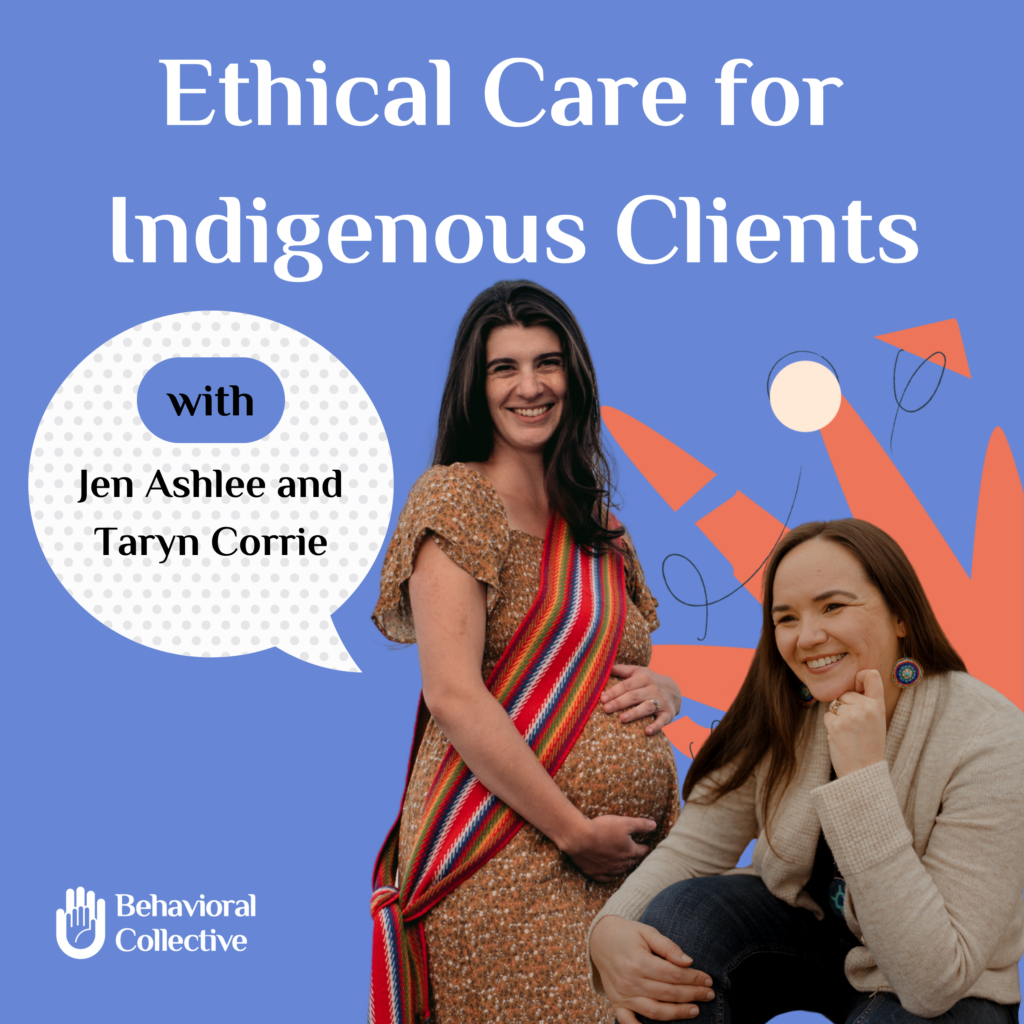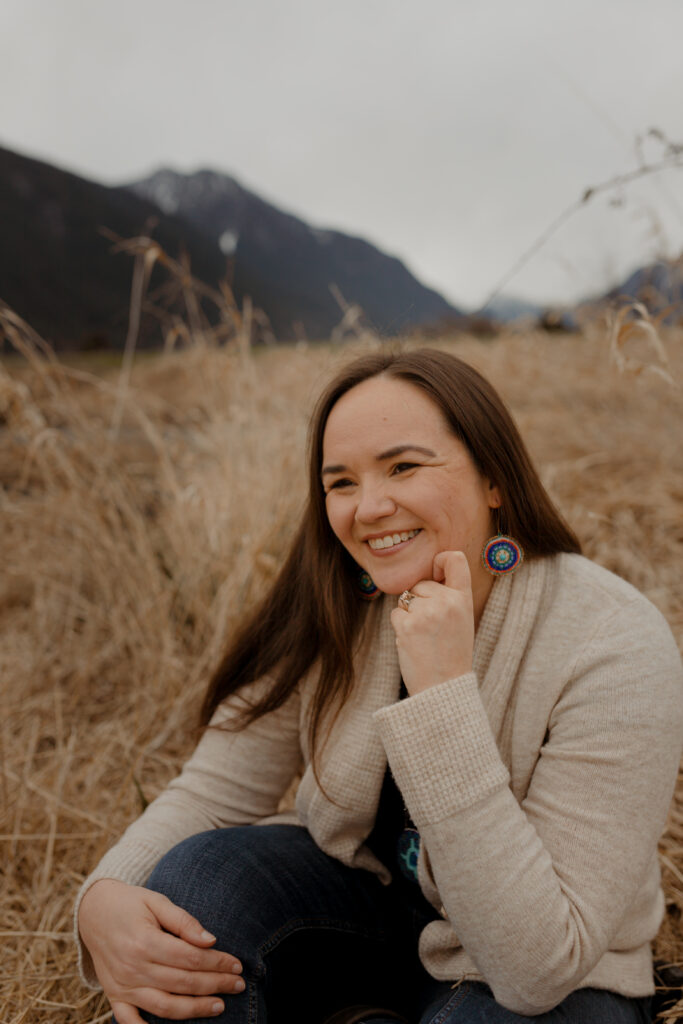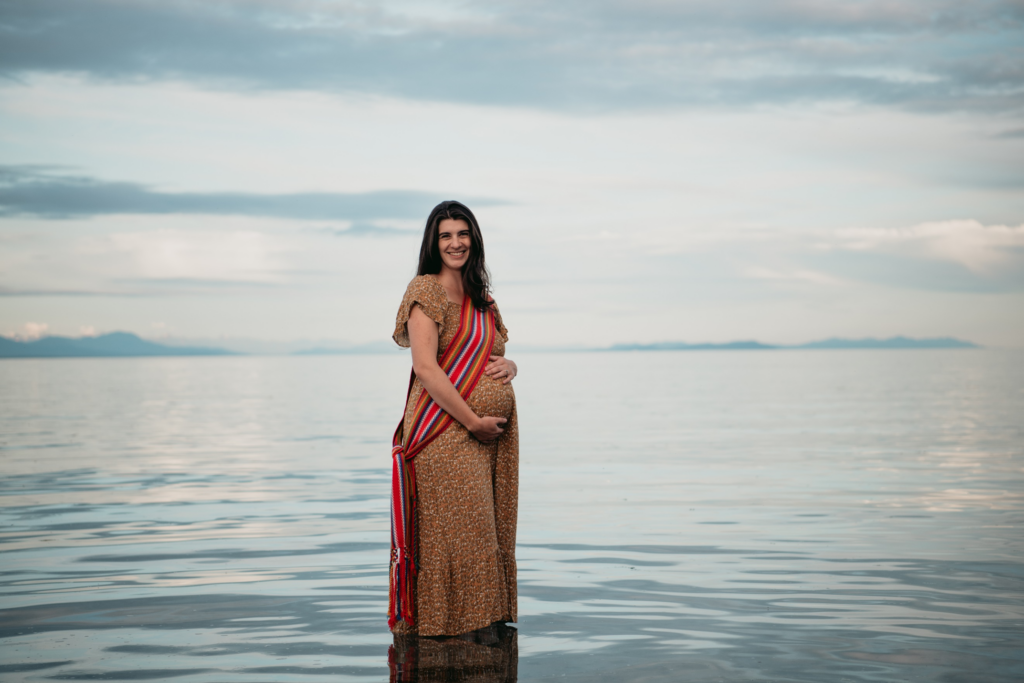Indigenous behavioral health practitioners, Jen Ashlee (BCBA) and Taryn Corrie (OT) join Erika to discuss their perspectives and share wisdom from their experiences. They go over ethical considerations in serving Indigenous clientele and provide some do’s and don’ts both in what they do in their own work but also practical advice for settler practitioners (i.e., non-Indigenous).
This episode was produced on the traditional and unceded territory of the Yuułuʔiłʔatḥ (Ucluelet) Nation.

Interview Highlights
” It looks different for everybody, and everyone’s at a different point, but it’s all that reclamation of it…don’t make assumptions, but also don’t ask things in a brash kind of way. Recognize that our culture is so sacred, that the way you ask us and the way you approach it should be done in a very genuine and careful way. Because it’s like you’re holding a piece of our heart” — Jen Ashlee (BCBA)
“Something that I do within my practice…when I first meet someone, I don’t bring a notebook and pen or any formal checklist or any of that because I find that very institutional…and I really focus on that connection and the relationship with the person” — Taryn Corrie (OT)
“What I do is I will take time to reflect before I walk in the room with the person, ‘What are my main things that I hope to discuss today?’ I will write them down on a piece of paper and I close the book and I leave it outside of the room, but I prepared myself [that] if these things come up, or if I see a window, I’m going to try to lead conversation there, and if it doesn’t go there, then fine, and if it does, great, and then when I leave, I will open my book back up, and then I’ll probably write down notes for 10 minutes about what happened when we were together, this is what they told me, and this is what came up.” — Jen Ashlee (BCBA)
“Especially within hospitals and schools, I will say it’s not always been a place of safety for our Indigenous folks and siblings and clients to take a deep breath and say, ‘I’m safe here.’ That’s not what the hospital signals” — Taryn Corrie (OT)
“You have to have an ongoing relationship, and you have to have ongoing communication, and you have to show up and set those meetings to communicate consistently, whether you have something written on your agenda for that meeting or not. Because oftentimes, the consistent space that is open..is like an invitation. So you’re showing, you’re tending to your relationship and you’re showing that I can show up when things are hard, I can show up when we’re just gonna chat casually and have lunch. But, I will always show up.” — Jen Ashlee (BCBA)
“Appropriation is you take something that is not yours, [and claim it to be yours. So don’t do that. But learning about someone’s culture shows an openness and a willingness. And when you use elements of culture within that context where they’ve given you permission, that is thoughtful and respectful.” — Jen Ashlee (BCBA)
“So instead of just barging in and demanding to know this or taking to again, really go slow. Listen and learn.” — Taryn Corrie (OT)
“The other big part that I really like is about the journey is we as professionals seem to feel that it’s our agenda and our lead. And in a journey, you’re not leading…You’re not in front and they walk behind You. This is not what’s happening. You are beside them, and I honestly see it as they take a little inch, they put one foot forward, and then I step beside them.” — Jen Ashlee (BCBA)
Meet Our Guests
Jen Ashlee is a British Columbia-based Indigenous Behaviour Consultant. She is Métis/Cree on her dad’s side and English on her mum’s. Her ancestral lands are located in northern Manitoba and Ontario. She currently resides on the traditional unceded territories of the Kwantlen and Katzie First Nations in Maple Ridge. Jen is passionate about incorporating the Indigenous Way of Knowing into her practice with children who are First Nations, Métis, or Inuit, and being an advocate for decolonizing therapeutic practices and systems we work within in so-called Canada.
Jen has completed her Master of Education in Digital, Online and Distance Education at Athabasca University, her Applied Behaviour Analysis coursework through Florida Institute of Technology and is a Board Certified Behaviour Analyst (BCBA). Jen has worked supporting neurodivergent children and adults since 2012 in a variety of roles and settings including home-based programs, clinic-based programs, in schools, residential settings, adult day programs, sports programs and supported child development programs both in BC and in the Northwest Territories. Jen enjoys consulting with community organizations to make systemic change and supporting service providers in their own Truth and Reconciliation journey.
She considers herself a lifelong learner, with a current focus in listening to the neurodivergent community, mental health supports and trauma-informed practices. In her spare time Jen enjoys yoga, nature, cooking, making art and spending time with her family and animals.
Website: www.ravenwinged.com
Instagram: @raven_winged_consulting

Taryn Corrie is a proud member of North Island Métis, Métis Nation B.C., and the Manitoba Métis Federation. Her ancestry includes Métis-Cree-Salteaux on her Father’s side, and French-Irish on her Mother’s side. Originating from the Red River Settlement in Manitoba, her family names are Cook, Linklater, Louis, Sanderson (nee Saunders), Short, and Slater.
Taryn is an Occupational Therapist by training. She has a Bachelor of Arts in Psychology from the University of Alberta and a Masters of Occupational Therapy from the University of British Columbia. Taryn has the privilege of living and working in ƛəmataxʷ, (Campbell River), nestled within the territory of the Liǧʷiłdax̌ʷ peoples; the WeWaiKai, WeiWaiKum, and Kwiakah Nations.
When she is not working, Taryn loves spending time outside with her daughter, husband, and animals. Connecting to culture by learning the Michif language (Northern dialect), and creating with her hands is something that Taryn loves to do late into the evening when her house grows still.
.

Resources Mentioned In This Episode:
- Raven Winged Consulting
- San’Yas training
- Len Pierre — language and territorial acknowledgements
- Four Seasons of Indigenous Learning
- Braiding Sweetgrass
Related Articles And Podcasts:
Proudly powered by WordPress
